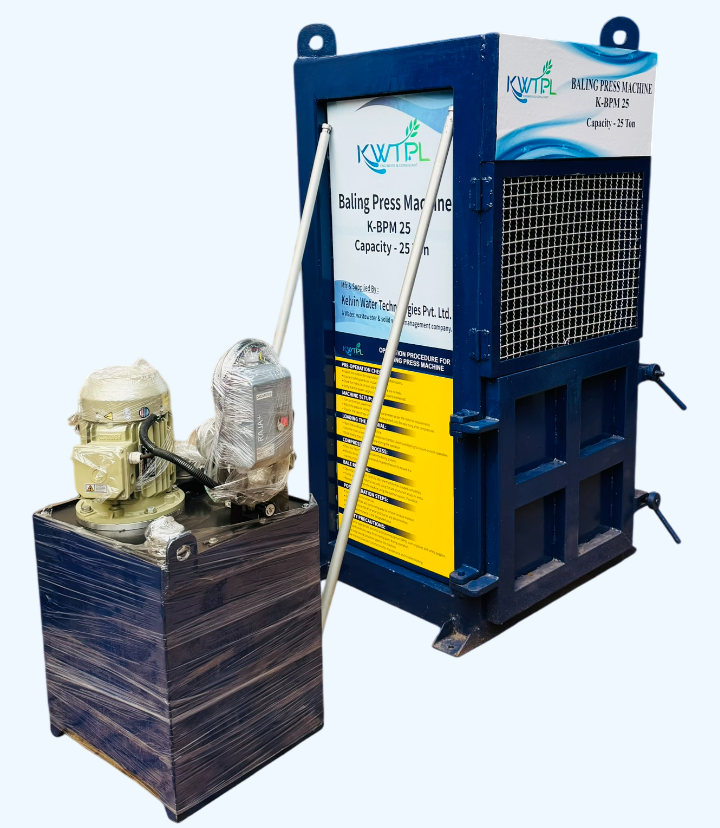Baling Press Machine Manufacturer in Delhi

Baling Machine is essential equipment for modern waste-management, recycling and materials-handling operations. In New Delhi — a densely populated industrial, commercial and institutional hub — demand for compacting, baling and processing recyclable materials (paper, cardboard, plastic, textile, metal fines) is high. Choosing the right baling press machine manufacturer in New Delhi affects throughput, safety, lifecycle costs and regulatory compliance
What is a Baling Press Machine?
A baling press machine compresses loose waste or recyclable material into compact, transportable bales. Machines vary by feed method (vertical/horizontal), drive type (hydraulic/mechanical), bale size, cycle speed and automation level. Properly specified balers reduce transport costs, improve storage efficiency and increase recycling yields.
Typical Applications in Delhi
- Commercial complexes & malls: Cardboard and plastic packaging from retail and food tenants.
- Manufacturing units: Textile offcuts, plastic scraps and light metal scrap.
- Municipal collection centres: Aggregation of segregated recyclables for onward sale
- E-waste & recycling yards: Pre-processing before shredding or sorting.
- Hospitals & hotels: Secure, compact disposal of non-hazardous stream materials.
Key Buying Criteria for a Baling Press Manufacturer in Delhi
1. Machine Type & Throughput: Match vertical/horizontal type and cycle time to your material and volume. Small vertical balers suit retail/shops; heavy-duty horizontal balers suit recycling yards.
2. Hydraulic Power & Reliability: Look for robust hydraulic systems with quality seals and overload protection to prevent downtime.
3. Bale Size & Density: Confirm bale dimensions and target density; higher density reduces freight and storage needs.
4. Automation & Safety: Safety interlocks, emergency stop, automatic tying, and PLC controls improve productivity and reduce operator risk.
5. Service & Spare Parts: Availability of local service engineers, spares and fast response times is crucial in Delhi’s busy environment.
6. Certifications & Compliance: CE/ISO standards, electrical safety and local environmental clearances where applicable.
7. Total Cost of Ownership: Consider energy consumption, maintenance intervals, consumables (wire/strapping), and resale value.
Technical Features to Watch For
- Build Material & Frame Strength: Heavy gauge steel frames and reinforced platen ensure long life.
- Control System: PLC with HMI for diagnostics, cycle control and remote alerts.
- Tying Mechanism: Manual twine, automatic wire/strapping or integrated tying pistons — choose by throughput and labour availability.
- Noise & Dust Controls: Enclosures and dust mitigation help meet occupational safety standards.
- Optional Feeding & Pre-Processing: Conveyors, cutters or shredders upstream improve feed consistency for mixed wastes.
Why Choose a Local Manufacturer in Delhi?
- Faster lead times and site visits for installation and commissioning.
- Easier coordination for customization — Delhi manufacturers can adapt bale sizes, hydraulic specifications and automation based on site constraints.
- Lower service response time since technicians and spare parts are nearby.
- Understanding of local material streams (what Delhi businesses commonly generate) improves recommendations and ROI estimates.
After-Sales Support — A Deal-Breaker
A reliable manufacturer should offer: installation & operator training, preventive-maintenance schedules, documented troubleshooting, and ready availability of critical spares (pumps, valves, PLC modules). Extended warranties and optional annual maintenance contracts (AMC) are highly recommended for continuous operations.
Case Use: Integrating Baling Presses into a Zero-Waste Workflow
A high-performing baler is part of a broader waste-management chain: segregation at source → shredding/pre-processing → baling → storage/transport → recycling. Integration with conveyors, shredders, and onsite waste-treatment systems (for organic or liquid waste) delivers maximum efficiency and regulatory compliance.
Kelvin Water Technologies — Role in Integrated Waste Management
Kelvin Water Technologies Pvt. Ltd. is a well-known Indian company specializing in advanced wastewater and solid-waste solutions. While Kelvin’s core product portfolio is widely recognized for Sewage Treatment Plants (STPs), Effluent Treatment Plants (ETPs), Organic Waste Converters (OWC) and industrial shredders, the company plays an important role in integrated and zero-waste solutions. For New Delhi customers seeking a one-stop approach, Kelvin offers:
- Complementary equipment & integration expertise: Kelvin’s experience with OWCs and industrial shredders makes them a strong partner when a baling press needs to be integrated into a broader onsite waste-management system (for example, pre-shredding bulky plastic to uniform feed for a baler or handling organic residues with OWCs).
- Turnkey project capability: Kelvin can design systems that combine liquid waste (STP/ETP) and solid-waste handling (shredders, conveyors, balers provided by trusted partners) into a single site solution that reduces transport and disposal costs.
- Compliance & sustainability focus: Kelvin emphasizes eco-friendly designs that help clients meet local pollution control norms and promote water reuse and resource recovery.
- After-sales service & AMC: Known for responsive support in industrial and municipal projects, Kelvin’s service capability helps maintain uptime across interconnected systems — important where balers are part of a continuous processing line.
Choosing the Right Supplier — Practical Steps
1. Site survey: Ask manufacturers to do an on-site material assessment.
2. Samples & Trials: Request sample bales or demo runs with your material.
3. References: Check case studies in New Delhi or similar operating conditions.
4. Compare TCO: Get detailed quotes covering installation, training and AMC.
5. Check compatibility: If you already have shredders, conveyors or OWCs (Kelvin or others), ensure the baler integrates smoothly.
Conclusion
For businesses in Delhi, selecting the right baling press manufacturer means balancing machine capability, local serviceability, safety and lifecycle cost. Combining a trusted local baler OEM with a systems partner like Kelvin Water Technologies — which brings wastewater, organic waste and shredding expertise — offers a practical route to an efficient, compliant and low-waste operation. Whether you’re a retail chain, recycler, manufacturer or institution, investing time in specification, demo trials and robust after-sales support will ensure your baling solution delivers long term savings and environmental benefits.